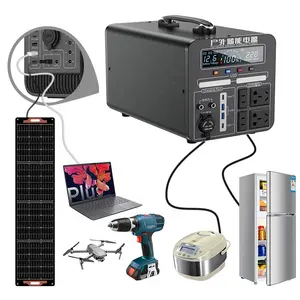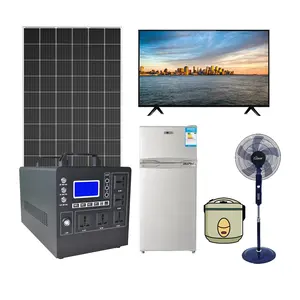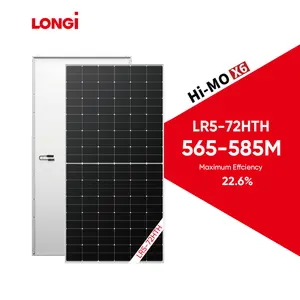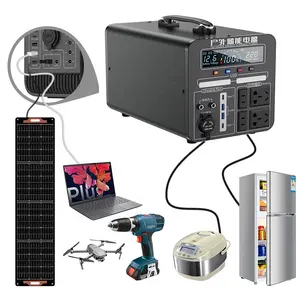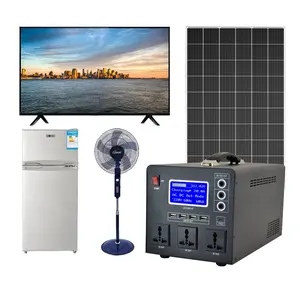Popular in your industry







































































Related Searches:































































































































Top categories
About 1000kw solar panel system
Understanding 1000 kW Solar Panel Systems
Solar panel systems, also referred to as photovoltaic systems, are engineered to capture solar energy and convert it into electrical power. These configurations consist of solar panels, an inverter, and optionally a battery for energy storage, along with a charge controller. Key adopters of solar panel systems span residential homeowners, commercial enterprises, and governmental bodies, all aiming to diminish their carbon footprint and energy expenditures. The scale of these systems varies from modest, individual-sized installations to expansive commercial arrays that power entire communities or facilities.
At the core of solar panel systems lies the direct transformation of sunlight into electrical energy. Sunlight, upon contact with the solar panels, activates electrons within the panel's material, generating an electric current. This current is either immediately utilized to power devices or conserved in a battery, contingent on the system's design. The conserved energy ensures a steady electrical supply during periods of diminished sunlight or nighttime.
For peak performance and durability, solar panel systems necessitate meticulous planning and professional installation. They are adaptable to a multitude of settings, from isolated off-grid locales to metropolitan rooftops, and can be grid-tied via inverters that convert the solar panels' direct current (DC) into alternating current (AC), suitable for domestic and commercial use. With technological advancements and escalating demand for renewable energy, solar panel systems are increasingly becoming a practical choice for sustainable electricity production.
Varieties of 1000 kW Solar Panel Systems
The market presents a spectrum of solar panel systems to meet diverse requirements and applications. Common types include:
-
On-grid Solar Systems: Grid-connected systems that provide energy to homes and businesses, enabling users to benefit from net metering policies that credit surplus energy back to the grid.
-
Off-grid Solar Systems: Suited for areas lacking grid access, these systems use batteries to store surplus energy for times when sunlight is scarce, often supplemented by a generator for additional backup.
-
Hybrid Solar Systems: Merging on-grid and off-grid features, hybrid systems offer adaptability and can be tailored to specific energy needs.
-
Portable Solar Systems: Crafted for portability, these systems are ideal for camping or travel where grid access is unavailable or inconvenient.
-
Solar Water Pumping Systems: Employed for drawing water from wells or reservoirs for irrigation or other water transportation needs.
Selecting a 1000 kW Solar Panel System
Choosing an appropriate solar panel system involves several critical considerations:
-
Efficiency and Space Requirements: Evaluate your business or community's energy demands and opt for a system that delivers efficiently. Monocrystalline and polycrystalline silicon panels may offer superior efficiency but come at a higher cost.
-
Location and Orientation: The geographic location for panel installation is crucial, as sunlight availability varies and affects system efficacy. Moreover, the panels' orientation influences their sunlight capture capacity.
-
Mounting Options: Residential systems commonly employ roof mounting, whereas ground mounting may be preferable for larger installations, depending on space availability and property structure.
-
Grid Connection and Energy Storage: Determine whether an on-grid system, which channels excess energy back to the grid, or an off-grid system, which operates autonomously, aligns with your energy needs. Energy storage is vital for off-grid systems to gauge how much energy can be reserved for future use.
-
Environmental Considerations: The installation environment—residential, commercial, or industrial—can dictate your choice, influencing mounting options for different settings.
When contemplating bulk purchases on Alibaba.com for a 1000 kW solar panel system, buyers should also consider potential customization options from suppliers to adapt the system to particular requirements.
About 1000 kW Solar Panel Systems on Alibaba.com
Alibaba.com distinguishes itself as a premier marketplace for entities in search of dependable solar panel system suppliers. Its extensive network bridges buyers with global suppliers, streamlining the procurement process with a wide array of systems designed for various commercial applications. Whether sourcing for large-scale projects or specialized endeavors, Alibaba.com simplifies the search with filters for system type, battery type, control type, and application.
Additionally, Alibaba.com equips businesses with tools that facilitate transactions and supplier communication in local dialects. Trade Assurance is one such feature, safeguarding payments until order completion. This dedication to secure trading underscores Alibaba.com's broader objective to render international commerce more attainable and secure.
For enterprises investing in green energy solutions, Alibaba.com serves as a portal to numerous suppliers offering bespoke systems that address unique needs. This adaptability is crucial for staying competitive in an industry increasingly focused on environmental stewardship and long-term fiscal prudence. Alibaba.com's holistic approach to B2B commerce positions it as an ally for businesses leveraging solar energy, promoting growth in a dynamic global market.
Common FAQs for Solar Panel System (1000 Kw)
What distinguishes MPPT from PWM solar charge controllers?
MPPT (Maximum Power Point) solar charge controllers outperform PWM (Pulse Width Modulation) counterparts in efficiency by aligning with the solar panel's optimal power point, thus enhancing energy conversion. PWM controllers, by contrast, can cause battery overcharging due to their continuous power modulation across the panel.
How can I ascertain the correct solar charge controller size for my system?
To identify the appropriate size, calculate your solar panels' wattage and anticipated energy output. The controller should be capable of managing your system's total wattage at maximum capacity.
Is compatibility universal between solar charge controllers and solar panels?
Not all solar charge controllers are universally compatible with every panel type. It is essential to ensure the controller's specifications align with your solar panels' requirements, including panel type, voltage, current output, and overall system capacity.
What should be taken into account when selecting a solar panel system's mounting type?
Ground mount systems are optimal for flat terrains or ground-level applications, whereas carport mounting is suitable for elevating panels and providing vehicle protection.
Do solar charge controllers accommodate all battery types?
While solar charge controllers are designed for various battery types, such as lithium-ion and lead-acid, selecting a controller that explicitly supports your battery type is crucial for optimal charging and efficiency.
What are the benefits of MPPT over PWM solar charge controllers?
MPPT solar charge controllers generally offer greater efficiency by enabling solar panels to operate at peak efficiency, tracking the array's power production, and adjusting the current for maximum performance.
How does the system type influence solar panel system selection?
The system type, whether off-grid or grid-tied, dictates the necessity for a standard MPPT controller for an off-grid setup or a hybrid system for grid connection, each with distinct requirements and functionalities.
Is it advisable to mix different brands or types of solar charge controllers in a single system?
Combining various brands or types of solar charge controllers is ill-advised due to potential compatibility issues. Controllers designed to operate cohesively within the same system are preferable.
How significant are the material and grade of a solar charge controller?
The material and grade of a solar charge controller are indicative of its robustness and operational performance. Superior materials and manufacturing processes yield a more dependable and enduring controller.
What are the hallmarks of a high-quality solar charge controller?
High-quality solar charge controllers are characterized by high efficiency, MPPT capability for optimal solar panel output alignment, over-discharge protection, and the use of premium construction materials.
Is it necessary to allocate a separate MPPT solar charge controller for each panel, or can multiple panels be linked to a single controller?
Although some MPPT controllers can accommodate multiple panels, having an individual MPPT controller per panel is typically more efficient, allowing for precise performance and monitoring.
How do portable solar charge controllers compare to fixed installations in terms of effectiveness?
Portable solar charge controllers, while generally smaller and less potent than fixed installations, can still effectively manage charging for devices, proving ideal for scenarios where portability is essential and capacity demands are moderate.
